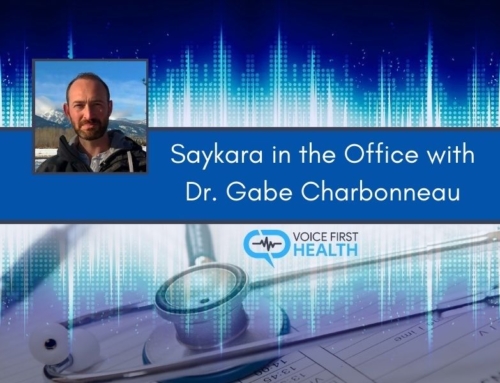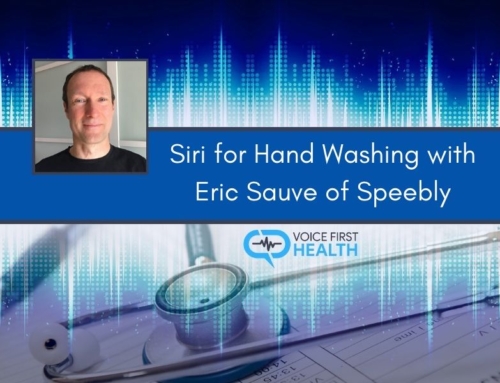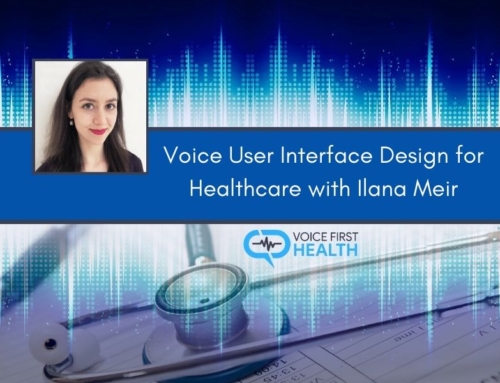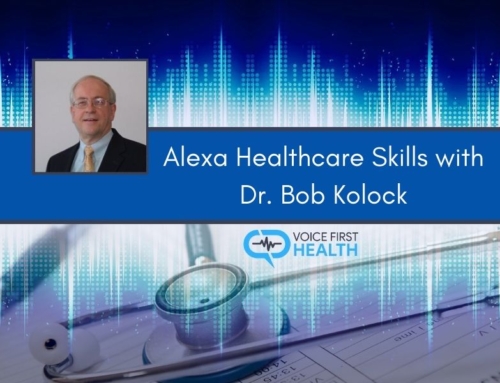VFH Episode 23
In this episode, Teri shares a recording of the talk he did at the Alexa Conference 2019.
Teri was recently at the 2019 Alexa Conference in Chattanooga, Tennessee, and was privileged to give a couple of talks, one of which he was able to broadcast live titled, “No Appointment Necessary; Your Healthcare Team Now Lives in your Home.” The talk was about how voice technology is completely changing the way that we are experiencing healthcare, and how this is going to occur over the next number of years. He took the recording of that talk and produced it as a podcast fro this blog!
Enjoy the Talk!
- Scenario: Imagine waking up and feeling like something is off. You have been rolling over in bed, you have a scratchy throat, a headache and you’ve been sweating all night. You start thinking you’ll have to call into work, you don’t know how you’ll get your kids to school, and maybe you need to see the doctor. You drag yourself into the car, drive to the doctor’s (assuming you’ve been able to make an appointment), you wait in the waiting room shivering, the doctor says you have to go to the pharmacy to pick up your prescription, so you do it. You go back home and climb into bed. What an ordeal!
Healthcare Systems
- There are a lot of great things going on in different healthcare systems but there are also a lot of problems.
- Teri has always struggled to figure out how we can make a change in healthcare systems. Attempts have been made, but things are very much the same.
- With voice technology, we will be able to radically transform the way that we all experience the whole healthcare journey.
Reference: The movie “Elysium”
- In the movie, people have sick bays (little mini-clinics) in their homes.
- It gives us an idea of where we could be going in the future.
- There is no doctor in the picture; it’s all based on what’s going on in the home.
- We are now in the primitive stages of such a scenario with voice technology, where we can now start to interact with these devices through our voices in a frictionless way such that pressure is taken off the healthcare system and that has a profound impact on patients.
- The technology has caught up to the fact that we no longer have to adapt to technology, the technology is adapting to us in our most natural form of technology.

Changing the way we experience healthcare
- We have yet to see a major change in healthcare.
- The ideal solution comes down to three factors; the right care, the right time, and the right place.
- The right care: To know the right care for us whenever we feel sick, we would need some type of resource to explain it to us. British Columbia, Canada has the HealthLink BC line where anyone can call 24 hours a day, 7 days a week, and get in touch with a health service navigator that gets them in touch with live health care professionals who can advise them accordingly. This type of service can be put into Alexa.
- The right time: This is a big problem in healthcare. People don’t get the healthcare they need at the time they need it. Voice assistants can become the triage nurses in homes, and they can play an important role in determining the right time for someone to get proper healthcare.
- The right place: It’s always hard to determine where to go when one is feeling sick. For example, this could be the hospital, the doctor’s office, the community clinic, a travel clinic, or a therapist’s office, etc.
Vocal biomarkers
- These are the metadata for voice.
- The metadata is different in someone’s voice when they say the same thing under different situations or conditions.
- Using algorithms and AI, we can pick out the different patterns in that metadata to make a diagnosis, monitor cognitive decline and many other possibilities that haven’t been thought of yet.
- Currently, vocal biomarkers can be used to aid in diagnosis. They can be used in real time emotional insights and can detect cognitive diseases.
Patient-centered healthcare
- The concept is based on the patient being at the centre of the healthcare team and everybody is doing their best to look out for the patient, and make sure that the patient is at the forefront of everybody’s mind.
- The problem with the concept is the maze of bureaucracy in healthcare systems which is very difficult for patients to navigate.
Patient-first healthcare
- Since we are going into “voice first”, we need to think about “patient-first healthcare” where a patient will be the leader of their healthcare journey. This can be achieved if the patient can tap into the technology in their home, get the guidance they need, and access the healthcare they need at the right time and at the right place.
- The Alexa devices we have in our homes can become little med-bays (little medical clinics). That would relieve so much pressure on the healthcare system and the overworked healthcare workers. It would also greatly improve the patient experience and the overall quality of care.









